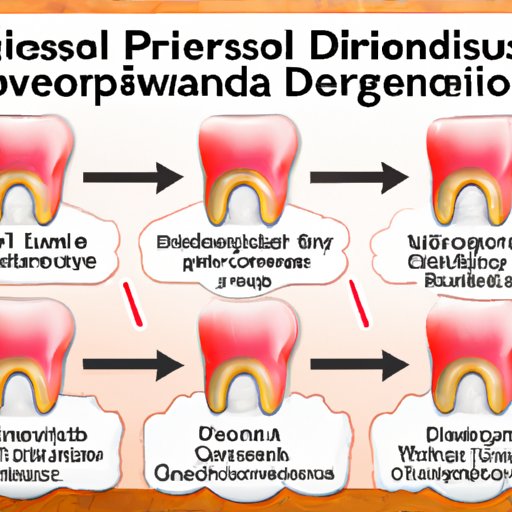
I. Introduction
Periodontal disease, also known as gum disease, is a common oral health problem that affects millions of people worldwide. It is caused by the buildup of bacteria in the mouth that can damage the gums and teeth. If left untreated, it can lead to tooth loss and other serious health problems. However, with the right knowledge and treatment, it is possible to reverse periodontal disease and restore healthy gums and teeth.

II. The Causes of Periodontal Disease: Identifying the Root of the Problem
Periodontal disease is caused by the buildup of plaque on the teeth and gums. Plaque is a sticky film of bacteria that forms on the teeth and gums after eating and drinking. If the plaque is not removed by brushing and flossing, it can harden into tartar, which can only be removed by a dentist or dental hygienist. Other risk factors for developing periodontal disease include smoking, genetics, and certain health conditions such as diabetes.
Research has also shown a strong connection between periodontal disease and overall health. Studies have found that people with periodontal disease are more likely to develop heart disease, stroke, and other systemic health problems.
III. The Importance of Regular Brushing and Flossing in Reversing Periodontal Disease
One of the most effective ways to reverse periodontal disease is by practicing good oral hygiene. This includes brushing your teeth twice a day and flossing at least once a day. It is important to use the proper technique when brushing and flossing to remove plaque and bacteria from the gums and teeth.
Brushing should be done using a soft-bristled toothbrush and fluoride toothpaste. The toothbrush should be held at a 45-degree angle to the gums and moved in a circular motion. Flossing should be done using a gentle back-and-forth motion to clean between the teeth and under the gum line.
In addition to daily brushing and flossing, it is important to schedule regular dental checkups and cleanings. This can help remove any plaque or tartar buildup that cannot be removed with regular brushing and flossing.
IV. The Role of a Healthy Diet in the Treatment of Periodontal Disease
A healthy diet is also important in maintaining healthy gums and teeth. A diet rich in fruits, vegetables, whole grains, and lean protein can help provide the vitamins and minerals needed for healthy teeth and gums. Foods to avoid include sugary and acidic foods and beverages, which can promote bacterial growth in the mouth.
In addition to a healthy diet, it may be necessary to take supplements to ensure adequate levels of vitamins and minerals. Vitamin C, for example, is crucial for healthy gums and can help reverse periodontal disease.
V. The Benefits of Professional Dental Cleanings in Reversing Periodontal Disease
A professional dental cleaning, also known as prophylaxis, is an essential part of preventing and reversing periodontal disease. This involves the removal of plaque and tartar that has built up on the teeth and gums.
During a dental cleaning, a dental hygienist will use special tools to scrape away any plaque and tartar buildup. They will also polish the teeth to remove any surface stains and apply fluoride to help protect the teeth against cavities. Dental cleanings should be done every six months to maintain healthy gums and teeth.
VI. Natural Remedies and Home Care Techniques to Reverse Periodontal Disease
There are also several natural remedies and home care techniques that can help reverse periodontal disease. Oil pulling, for example, involves swishing a tablespoon of coconut oil in the mouth for 20 minutes. This can help reduce the amount of bacteria in the mouth and promote healthy gums.
Other natural remedies include salt water rinses, which can help reduce inflammation and promote healing, and herbal remedies such as aloe vera and tea tree oil.
In addition to natural remedies, adopting healthy habits such as quitting smoking and reducing stress can also help promote healthy gums and teeth.
VII. The Role of Antibiotics and Other Medications in Treating Periodontal Disease
In cases of advanced periodontal disease, antibiotics may be prescribed to help control bacterial growth and prevent further damage to the gums and teeth. Antibiotics may be taken orally or applied directly to the affected area.
Other medications that may be used to treat periodontal disease include antimicrobial mouth rinses and gels, which can help reduce the amount of bacteria in the mouth.
VIII. The Importance of Lifestyle Changes in Shedding Light on Periodontal Disease and Finding a Cure
Lifestyle changes such as eating a healthy diet, quitting smoking, and reducing stress can also help prevent and reverse periodontal disease. Stress can weaken the immune system, making it more difficult for the body to fight off infections such as periodontal disease.
Smoking is also a major risk factor for periodontal disease and can make it more difficult to treat. Quitting smoking can help improve oral health and reduce the risk of developing other health problems such as heart disease and lung cancer.
IX. Conclusion
Periodontal disease is a common oral health problem that can have serious consequences if left untreated. However, with the right knowledge and treatment, it is possible to reverse periodontal disease and restore healthy gums and teeth. By practicing good oral hygiene, adopting healthy lifestyle habits, and seeking professional dental care, you can maintain healthy gums and teeth for a lifetime.
To learn more about how to prevent and treat periodontal disease, schedule a visit with your dentist or dental hygienist today.





